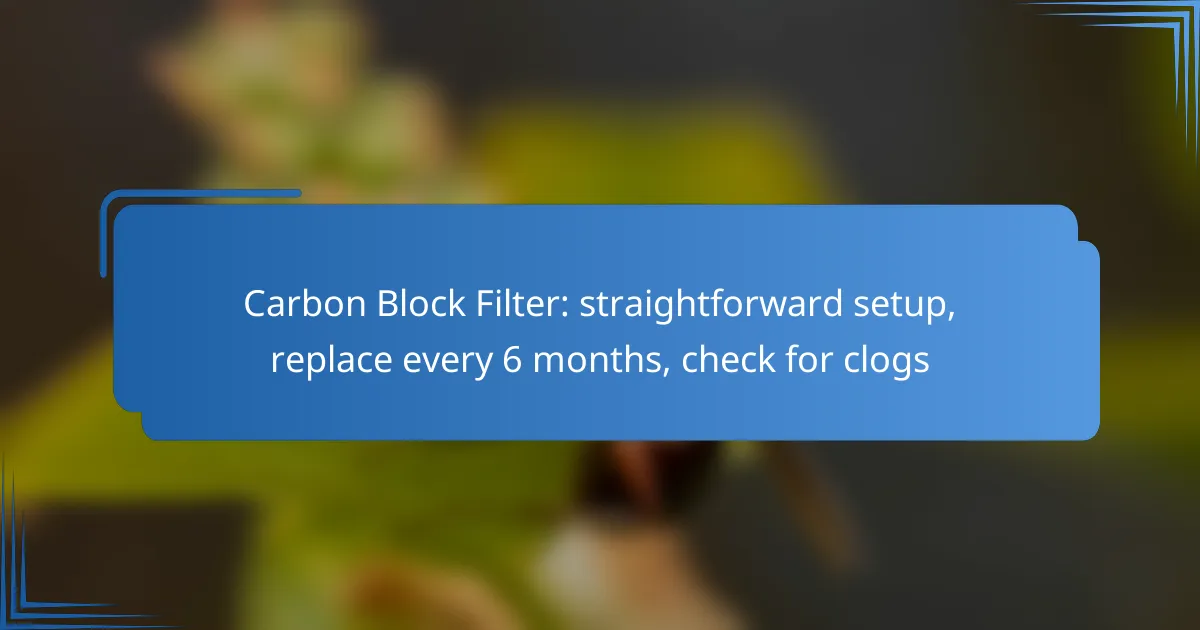Installing a carbon block filter is a simple process that significantly improves water quality by effectively removing impurities. To maintain its efficiency, it is recommended to replace the filter every six months and regularly check for clogs through visual inspections and flow rate tests.
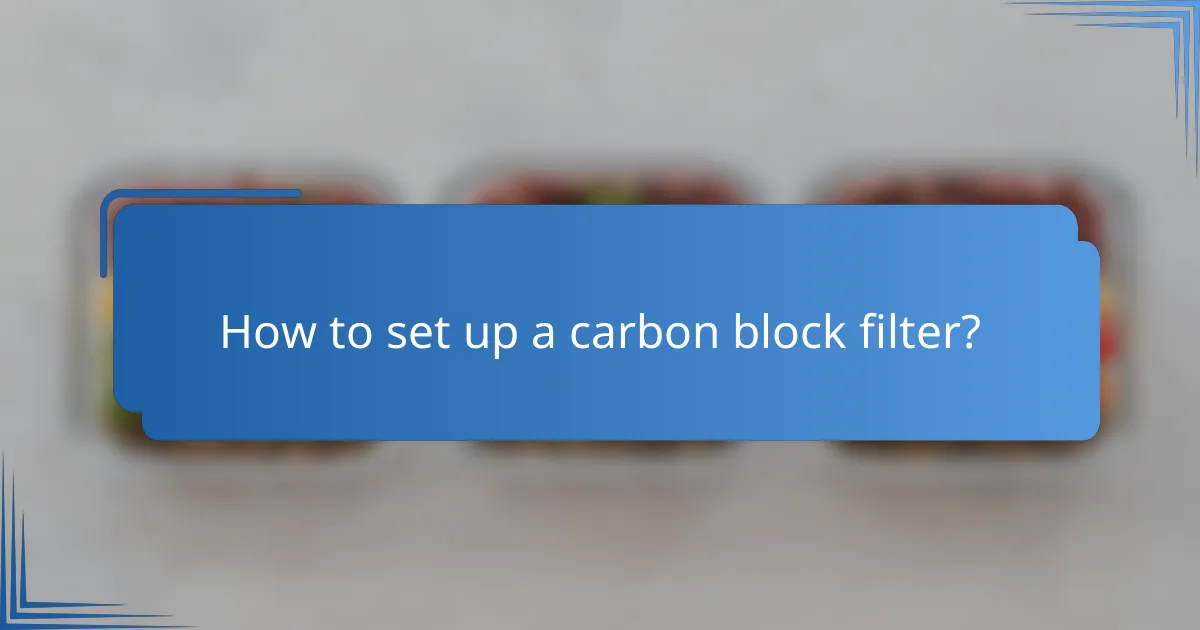
How to set up a carbon block filter?
Setting up a carbon block filter is a straightforward process that enhances water quality by removing impurities. Proper installation ensures optimal performance and longevity of the filter, which should be replaced every six months or when clogged.
Step-by-step installation guide
Begin by turning off the water supply to prevent leaks during installation. Next, remove the old filter by unscrewing it from the housing, and clean the housing to eliminate any debris. Install the new carbon block filter by screwing it into place, ensuring a tight seal to avoid leaks.
Once the new filter is installed, turn the water supply back on and check for leaks. Run the water for a few minutes to flush out any carbon dust before using it for drinking or cooking.
Required tools and materials
To set up a carbon block filter, you will need a few basic tools and materials. Commonly required tools include a wrench for tightening connections and a bucket to catch any water that may spill during the process.
Materials needed consist of the new carbon block filter, plumber’s tape for sealing threads, and possibly a replacement O-ring if the old one is worn. Ensure that the filter you purchase is compatible with your specific filtration system.
Common installation mistakes
One frequent mistake is failing to turn off the water supply, which can lead to messy leaks. Another common error is not properly cleaning the filter housing before installation, which can affect the new filter’s performance.
Additionally, neglecting to check for leaks after installation is a mistake that can result in water damage. Always ensure that the filter is securely tightened and monitor it for any signs of leakage in the days following installation.
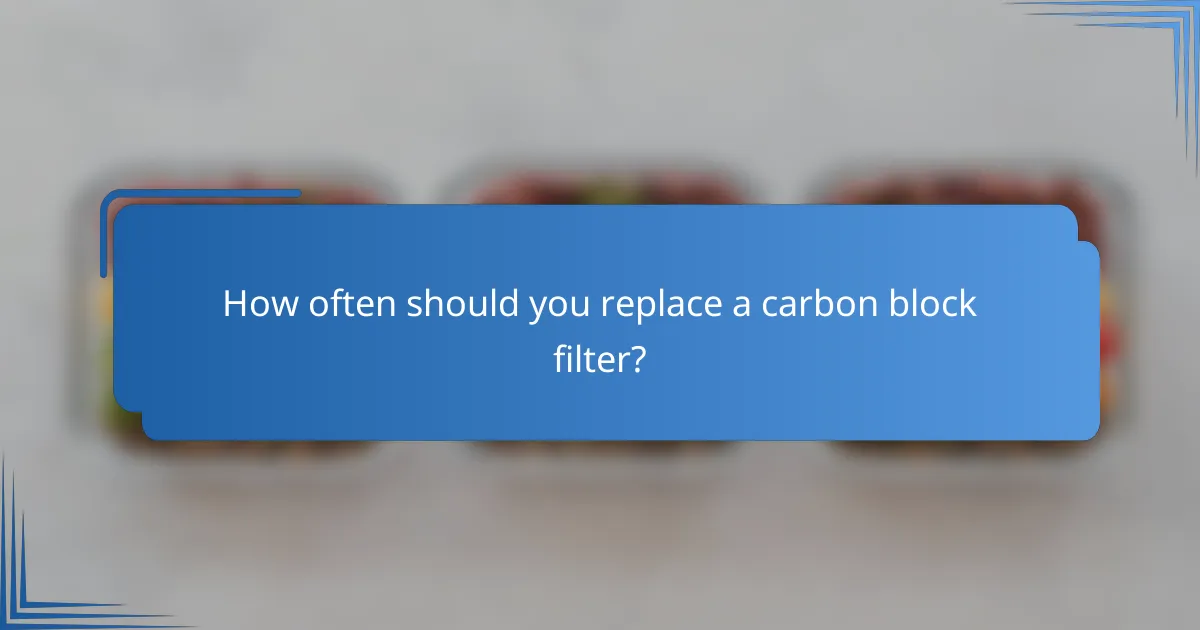
How often should you replace a carbon block filter?
A carbon block filter should typically be replaced every six months to ensure optimal performance. Regular replacement helps maintain water quality and prevents clogs that can affect filtration efficiency.
Recommended replacement frequency
To keep your water filtration system functioning effectively, aim to replace the carbon block filter every six months. This timeframe can vary based on water quality and usage; if your water has higher sediment levels or if you use more water than average, consider replacing it more frequently.
Some manufacturers may provide specific guidelines based on their products, so always check the recommendations for your particular filter model.
Signs of filter degradation
Common signs that your carbon block filter may need replacement include a noticeable change in water taste or odor, reduced water flow, or visible discoloration of the filter itself. If you notice any of these symptoms, it’s time to check the filter.
Additionally, if your water has a higher level of contaminants, you may experience more rapid degradation, necessitating earlier replacement.
Impact of delayed replacement
Delaying the replacement of a carbon block filter can lead to reduced water quality and increased health risks. As the filter becomes clogged, it may allow contaminants to pass through, compromising the safety of your drinking water.
Furthermore, a clogged filter can strain your water system, potentially leading to more costly repairs or replacements down the line. Regular maintenance is key to avoiding these issues.
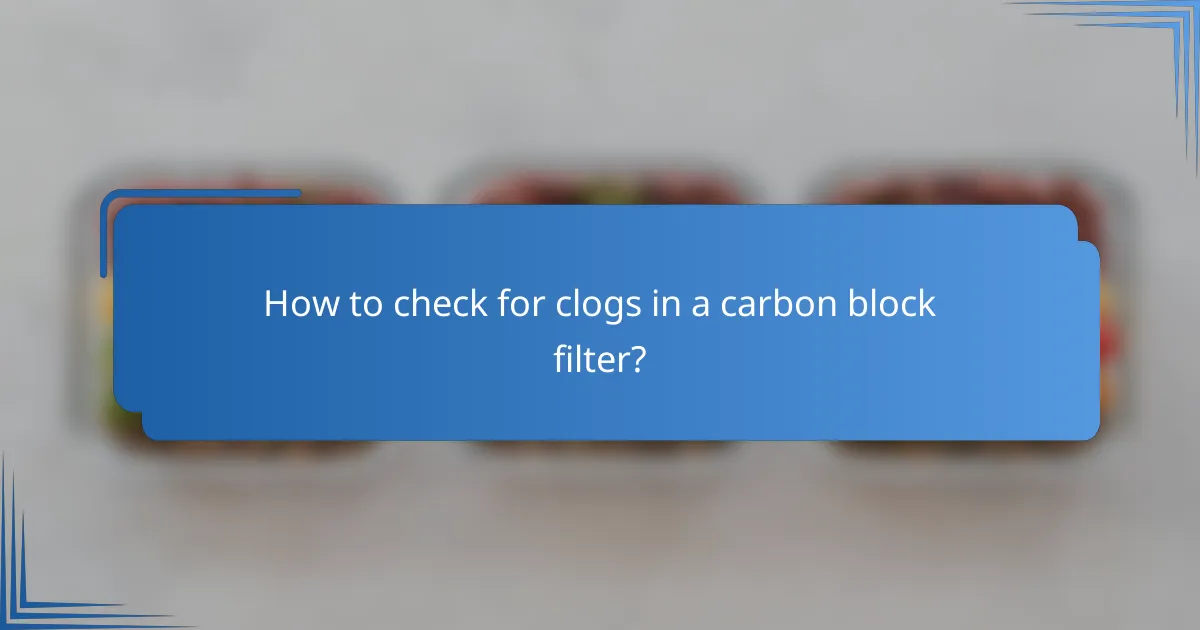
How to check for clogs in a carbon block filter?
To check for clogs in a carbon block filter, perform visual inspections, test the water flow rate, and use specific tools designed for clog detection. Regular checks ensure optimal performance and help maintain water quality.
Visual inspection techniques
Start by visually inspecting the carbon block filter for any noticeable discoloration or debris accumulation. A filter that appears darkened or has visible particles may indicate clogging.
Additionally, check the filter housing for leaks or signs of wear. If the filter looks damaged or excessively dirty, it may need replacement even if it hasn’t reached the six-month mark.
Testing water flow rate
Measuring the water flow rate is an effective way to assess filter performance. A significant drop in flow rate compared to the normal range suggests that the filter may be clogged.
To test, simply time how long it takes to fill a container of known volume. If it takes considerably longer than usual, consider replacing the filter or checking for clogs.
Tools for clog detection
Use a flow meter to accurately measure the water flow rate through the filter. This tool provides precise readings and helps identify any significant changes in performance.
Additionally, a pressure gauge can be useful for detecting clogs. By measuring the pressure before and after the filter, you can determine if there is a significant difference that indicates a blockage.
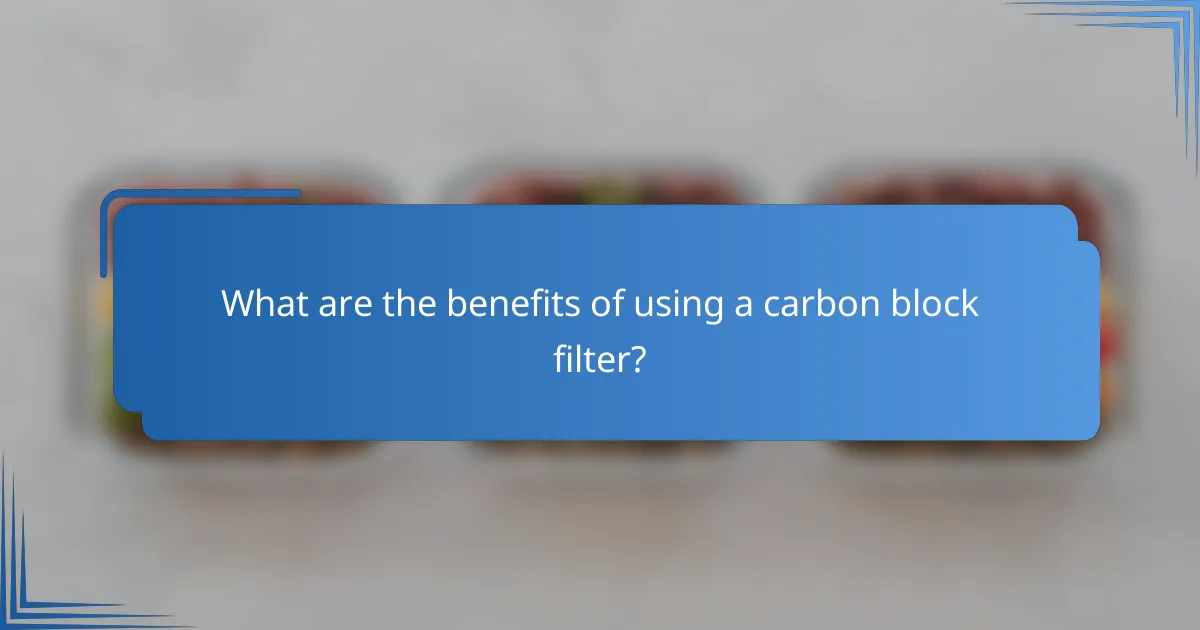
What are the benefits of using a carbon block filter?
A carbon block filter provides several advantages, including improved water quality, effective contaminant reduction, and cost savings over time. These filters work by adsorbing impurities, resulting in cleaner and better-tasting water.
Improved water taste and odor
One of the primary benefits of a carbon block filter is its ability to enhance the taste and smell of water. By removing chlorine, sediment, and other organic compounds, these filters significantly reduce unpleasant flavors and odors.
For instance, if your tap water has a strong chemical taste, a carbon block filter can help eliminate that, making your drinking water more palatable. Regular maintenance, such as replacing the filter every six months, ensures optimal performance.
Reduction of contaminants
Carbon block filters are effective at reducing a wide range of contaminants, including heavy metals, pesticides, and volatile organic compounds (VOCs). This filtration process helps provide safer drinking water by trapping harmful substances within the carbon structure.
Many carbon block filters meet NSF/ANSI standards, which certify their ability to reduce specific contaminants. It’s essential to choose a filter that addresses the particular impurities present in your local water supply.
Cost-effectiveness over time
Using a carbon block filter can be a cost-effective solution for improving water quality. While the initial investment may vary, the long-term savings from reduced bottled water purchases and fewer plumbing issues can be significant.
Replacing the filter every six months typically costs less than $50, making it an economical choice compared to other filtration systems. Additionally, the convenience of having clean water at home can save both time and money in the long run.
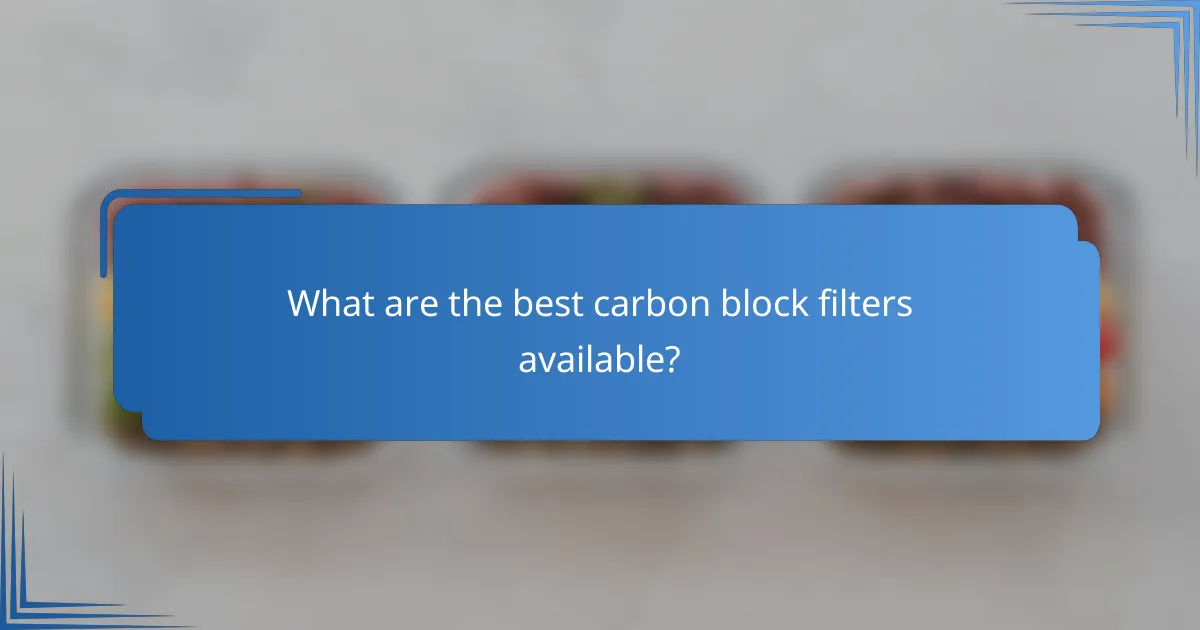
What are the best carbon block filters available?
The best carbon block filters are designed to effectively reduce contaminants in water, providing cleaner and better-tasting drinking water. Popular options include those from well-known brands that offer reliable performance and easy installation.
Top-rated brands comparison
Leading brands in the carbon block filter market include Brita, PUR, and APEC. Each brand offers a range of filters that vary in capacity, filtration efficiency, and compatibility with different systems. Brita filters are known for their affordability and ease of use, while APEC is often favored for its high filtration standards.
When comparing brands, consider factors like the filter’s lifespan, which typically lasts around six months, and the specific contaminants each filter targets. This will help you choose the best option for your needs.
Consumer reviews and ratings
Consumer reviews often highlight the effectiveness of carbon block filters in improving water taste and reducing odors. Many users report satisfaction with the performance of brands like PUR and Brita, noting that they notice a significant difference in water quality.
Ratings on platforms like Amazon and Home Depot generally reflect a positive reception, with many filters receiving four to five stars. However, some users caution about potential clogging issues, emphasizing the importance of regular maintenance and timely replacements.
Price range analysis
The price of carbon block filters typically ranges from around $20 to $60, depending on the brand and features. Basic models may cost less, while advanced filters with additional features or higher capacities can be on the pricier side.
When budgeting for a carbon block filter, consider not only the initial purchase price but also the cost of replacements every six months. This ongoing expense is crucial for maintaining optimal water quality and ensuring the filter operates effectively.
